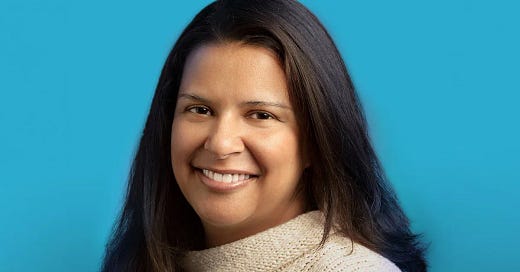This article is part of Fintech Leaders, a newsletter with almost 70,000 builders, entrepreneurs, investors, regulators, and students of financial services. I invite you to share and sign up! Also, if you enjoy this conversation, please consider leaving a review on Apple Podcasts or Spotify so more people can learn about us.
Diya Jolly is the Chief Product and Technology Officer at Xero, a $22Bn tech giant that offers accounting and CFO management services for small businesses worldwide.
Xero is one of the largest fintechs in the world they’ve doubled their revenue over the last three years.
Prior to Xero, Diya was the Chief Product Officer at Okta and before that she held multiple leadership product roles at Google.
She’s extremely thoughtful and this conversation is a delightful masterclass on building a tech and software business.
In this episode, we discuss:
The tensions of product managers and how to navigate them
“A lot of product managers think it's their job to generate all the ideas, but it's not. The job of product manager is to collect the ideas and curate them based on the best idea.”
One of the biggest tensions product managers often face, is balancing features that provide quick customer satisfaction with those that will differentiate the company in the market. This balancing act requires product managers to prioritize both immediate customer needs and long-term competitive advantages. Diya is a proven product and tech leader with a track record of driving product innovation at Google, Okta, and Xero. In her many roles, she has learned to navigate decision-making with imperfect info, blending insights informed by data, qualitative customer feedback, and personal intuition.
Additionally, she currently holds a dual role overseeing both product and technology at Xero, which means navigating an even larger number of competing demands from various teams—marketing, sales, and engineering. To get things done, she reminds us of the importance for product managers and CTOs to step into each other’s shoes, ensuring that innovation does not come at the expense of platform stability, and vice versa.
Frameworks to make good decisions with incomplete information
“It's okay to change your mind. You can't change your mind on everything all the time, because your team will spin, but there are decisions where you will be like, I'm making the best decision in this minute given the information I have, because it's better to move forward than sit here.”
Prioritizing Action Over Perfection: Diya operates with a pragmatic approach to decision-making. Waiting to collect 100% of the data is not only unrealistic, but yields diminishing returns. Instead, she recommends tech leaders should strive for around 70% of the necessary info, and rely on one’s ability to map out a decision tree and assign probabilities to potential outcomes. This approach allows teams to move forward with confidence, even when data is incomplete.
Channeling her inner Bezos, Jolly also recognizes the importance of identifying whether a decision can or cannot be reversed after the fact. If a decision is reversible, one of the best ways to gather more information is by taking action and moving forward with a strategy. You will then collect feedback and can change direction or pivot in the face of better data.
Is cannibalizing your own product ever a good idea?
"In the absence of any other constraint, cannibalizing your product is the right thing to do."
Cannibalizing your own product is generally the right move to maintain competitiveness in tech. It does not matter who you are or what you have built, innovation will eventually outpace any product that doesn’t evolve. However, tech leaders will often have to do this in a measured way considering real-world constraints - newer products might need more time and investment to reach their full potential, which can delay the process of cannibalizing existing offerings.
As CPO and CTO of a public company, Diya acknowledges the pressure to balance innovation with shareholder expectations. Public companies may need to cannibalize their products at a slower pace to meet financial goals and avoid abrupt impacts on profitability. This financial reality plays a key role in deciding when and how fast to push new innovations forward.
How AI is revolutionizing accounting… and a lot more!
Shortly after leaving her CPO role at Okta in early 2023, Diya was considering launching an AI-powered accounting company. But she quickly realized a startup’s lack of customer data would significantly limit the effectiveness of the models. This is particularly important in accounting, where accurate data is essential for automating tasks like bank reconciliations or predicting cash flow trends. Instead, she saw a huge opportunity to build these tools as a leader at Xero.
She’s now extremely passionate about LLM’s potential to transform accounting and is convinced GenAI will be able to automate time-consuming, repetitive tasks such as data entry, bank reconciliations, and invoice management. Tools like Xero's Hubdoc or JAX are already leveraging AI and next-gen OCR to automatically scan and input data from documents or provide a GenAI companion for business owners, but it seems those are just the tip of the iceberg and we can expect much more innovation to come in this space.
Want more podcast episodes? Join me and follow Fintech Leaders today on Apple, Spotify, or your favorite podcast app for weekly conversations with today’s global leaders that will dominate the 21st century in fintech, business, and beyond.


























Share this post